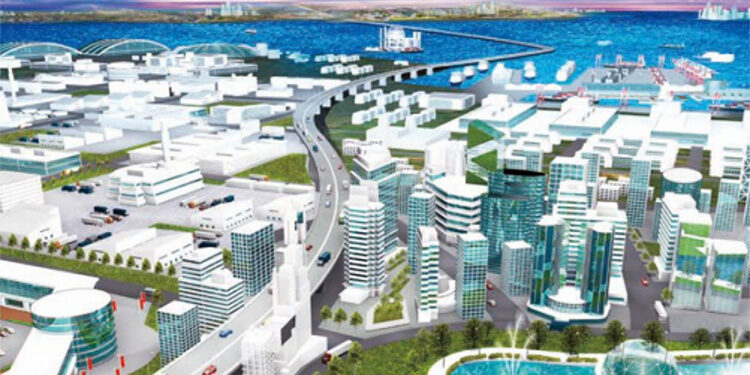The Dongo Kundu Special Economic Zone (SEZ), one of the components of the Mombasa Port Development Project (MPDP), is expected to spur related economic activities within the region and transform Mombasa into a regional logistics and manufacturing hub.
The SEZ seeks to expand the capacity of Mombasa Port and enhance logistics along the Northern Economic Corridor. The port serves Uganda, Rwanda, Burundi, the Democratic Republic of Congo (DRC), South Sudan, Somalia, southern Ethiopia, and northern Tanzania.
Japan-based Toa Corporation won the tender for the Sh50 billion project, which will be completed by 2026. During construction and after completion, the project will provide thousands of jobs to Kenyan youth.
The SEZ is strategically located near the port, Mombasa Southern Bypass, Standard Gauge Railway (SGR), and Moi International Airport. Already, several logistics infrastructural projects and facilities have been completed.
Dongo Kundu has been subdivided to accommodate a Freeport Area, Road Network, Water Distribution Centre, Enterprise Area, Industrial Parks, and Free Trade Zone. The Free Port, which will be connected to the sea through a road network, will have several berths for general cargo, vehicles, and bulk grain handling facilities.
As a duty-free area with other tax-friendly measures, the project has generated immense enthusiasm from investors who have already expressed interest in our progress. Some of the fiscal incentives of SEZs include a lower corporate income tax of 10 percent for the first 10 years, 15 percent for the next 10 years, and 30 percent thereafter.
The establishment of the SEZ will transform several business models and translate to lower costs of goods and services for Kenyans. With vehicle assembly units at SEZ, the cost of cars will drop significantly because freight will not be a cost component, while there will be flexibility in applying the 8-year-old import rule for used vehicles. Vehicle dealers will have the opportunity to import them as parts for local assembly, which will create jobs for Kenyans.
The textile and apparel industry, through the US African Growth and Opportunity Act (AGOA), will get a huge boost. Kenya’s textile and apparel sector has recorded major growth, with monthly exports hitting Sh4.5 billion, or Sh150 million per day, in the last year.
The sector also experienced steady growth in capital investment, with a 7.2 percent increase from 2018 to 2022, in which 36 firms with a capital investment of Sh24.88 billion employed 66,260 people and generated exports worth Sh54.12 billion. Since most of the materials for making garments are imported, it will be easier to make clothes at SEZ for re-export.
The SEZ will boost the value addition of agricultural products such as coffee and tea before export. Also, oil dealers who extract several products from crude oil can ship the consignment and make several products at the SEZ for local and regional markets. This will translate into more ships calling at the port, which will boost KPA’s revenues.
The Dongo Kundu SEZ has the potential to transform the region’s economic dynamics since it connects the Indian Ocean with the rest of Africa, stimulates regional investments, revitalizes economic activities, and creates thousands of jobs.
With an ideal location for regional Pan-African operations—an area dedicated to the Africa Continental Free Trade Area (AfCFTA)—the port will provide access to regional markets and provide a catalyst for local private sector development.
This article was published by Githua Kihara, an editorial consultant for FEAFFA’s Freight Logistics Magazine. For any inquiries, please contact us via email at editorial@feaffa.com or freightlogistics@feaffa.com, or reach out to Andrew Onionga directly at onionga@feaffa.com / +254733780240.





